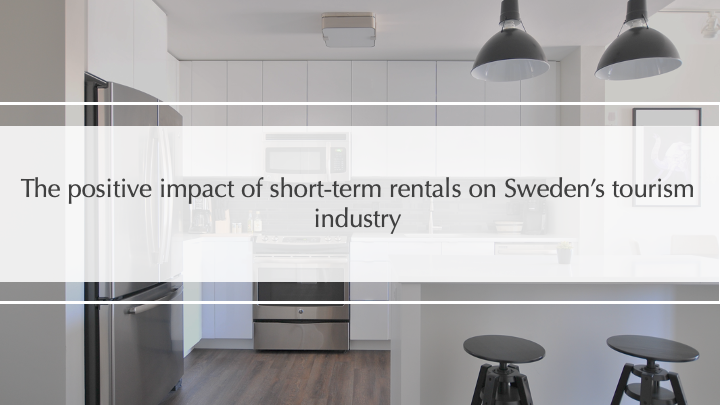
The tourism industry in Sweden has been positively evolving in recent years with a growing number of business and holiday travellers who are increasingly looking for short-term rental accommodation options that meet their specific needs. This trend is confirmed by the growing popularity of short-term rentals, particularly on online platforms such as Airbnb, Booking.com and VRBO, which offer many advantages for both travellers and the tourism industry. These online platforms have revolutionised the tourism industry by offering unique accommodation options and making booking easier for holiday and business travellers from around the world to visit and explore Sweden’s cities including Stockholm, Goteborg, Malmö, Lund and Uppsala. Short-term rental properties have significantly and positively influenced the tourism industry and continues to bring many benefits to travellers and property owners and investors.
In this article we will learn more about the tourism sector in Sweden. Then we will see how short-term rentals have modernised the tourism sector in Sweden. We will discover the five most touristic cities in Sweden. In addition, we will see the benefits that short-term rental properties bring to the tourism sector.
The tourism sector in Sweden
In recent years, Sweden has experienced spectacular growth in the tourism sector, propelling the country to the top destination. Sweden ranks eighth among the most visited countries in Northern Europe. What attracts travellers from around the world is Sweden’s breathtaking natural beauty, with its vast forests, lakes, and breathtaking coastal landscapes. Sweden is not limited to its majestic nature. Swedish cities such as Stockholm, Göteborg, Uppsala and Malmö offer a perfect combination of modernity and traditional charm. In addition, Sweden is renowned for its commitment to the environment and sustainability, which attracts many eco-friendly travellers. “Following Australia’s lead, Sweden was the second country in the world to introduce an ecotourism charter.” Sweden leads the way in innovation in environmentally friendly tourism. With a sustainable tourism infrastructure and innovative visitor initiatives, Sweden is proudly positioned as one of Europe’s most popular travel destinations.
Modernising the tourism industry with short-term rentals
The emergence of platforms such as Airbnb, Booking.com and VRBO has profoundly changed the tourism industry with the growing popularity of short-term rentals. This new form of accommodation has brought about significant changes, offering travellers a wide choice and making travel more affordable. Airbnb, the leading platform in this sector, expects for this year 2023 “over 300 million guest arrivals on Airbnb.” The arrival of short-term rentals has intensified competition in the accommodation sector. Traditional hotels now face direct competition with more affordable, flexible and specialised offers. Short term rentals are the choice of accommodation to live a personalised and customized experience.
“Short-term rentals have really changed the way I travel, I don’t just visit destinations anymore, I live them. By choosing accommodation with SwedBNB, I had the opportunity to immerse myself in the local Swedish culture and discover authentic neighborhoods. It was an enriching experience that allowed me to create unforgettable memories.”
SwedBNB guest, June 2023

Short-term rentals have modernised the tourism industry by offering a variety of unique accommodation options. Travellers are no longer limited to traditional hotels, but can now opt for apartments, holiday homes and cottages. This variety of options allows travelers to find accommodation perfectly suited to their needs, preferences and budget. Short-term rentals have allowed more owners to share their homes. Short-term rental property management companies like SwedBNB help owners through the entire rental process. SwedBNB allows the owner to no longer have stress and to be away from all rental management. SwedBNB considers the property of its customers as their own. Thanks to SwedBNB, many owners have the opportunity to rent their property for a short period of time with peace of mind, which has greatly expanded the possibilities for travellers in Sweden.
Short-term rental properties have transformed the way holiday and business travellers book their accommodation thanks to easy accessibility. Booking platforms such as Airbnb offer a user-friendly interface where travelers can view thousands of accommodation listings and filter results based on their preferences. This allows travelers to easily compare prices, amenities and locations, making it easier to find the perfect accommodation. Short-term rental platforms have stimulated innovation in the tourism industry. Accommodation owners are encouraged to offer additional services to stand out from the competition. In addition, travellers often benefit from greater booking flexibility, with more flexible check-in and check-out options. All of this contributes to improving the traveller experience and modernizing the tourism industry.
The five most touristy cities in Sweden:
– Stockholm: Sweden’s capital offers a wealth of culture and history with its museums, magnificent architecture and archipelago. Discover SwedBNB accommodation in Stockholm by clicking here.
– Göteborg: Seduced by its picturesque canals, lush green parks and lively gastronomic scene. Book your large family home by clicking here.
– Malmö: Located in the south, Malmö combines modernity and heritage with its contemporary architecture, famous Öresund bridge and multicultural atmosphere.
– Uppsala: A historic city renowned for its prestigious university and majestic cathedral. Discover your large family home beside forest in Uppsala by clicking here.
The advantages of short-term rental for the tourism industry
Affordable price trends
Short-term rental has had an impact on prices. Increased competition between short-term rentals and hotels has also had an impact on prices. Hotels have had to adjust their rates to remain competitive with short-term rentals, which often offer more affordable rates for short-term stays. Short-term rentals can often be more affordable than hotel stays, especially for families or groups of travellers. Short-term rental rates are often based on the length of stay and not on the number of people, which allows for significant savings. In addition, travellers can save on the extra costs often associated with hotels, such as restaurant meals and laundry services. This has given travellers more opportunities to find accommodation at lower prices, which has helped make tourism more accessible for more people.
Contribution to the local economy:
The rise of short-term rentals has also had an impact on the areas where these accommodations are concentrated. Some areas have seen a significant increase in visitor numbers and tourism activities. Short-term rental has a positive impact on the local economy. When travellers choose to rent accommodation from local owners, this generates additional income for the local community. These revenues can then be reinvested in local businesses, restaurants and services, creating a positive impact on the entire tourism industry.

Personalised experiences for travellers
Short-term rentals, such as Airbnb, offer a more personalised experience for travellers. When they choose to stay in these accommodations, travellers not only have a temporary roof over their heads, they also benefit from expert advice and recommendations from local hosts. Hosts can share exclusive recommendations on the best restaurants, cultural events and unusual activities not to be missed. By staying in residential areas, travellers can discover the local culture, sample regional cuisine and interact with locals. This creates a more enriching and memorable experience, different from that offered by standardised hotels located in tourist areas. This authentic interaction with the locals creates a special link between travellers and the local community, helping to boost tourism in the region.
Sustainable, environmentally-friendly impact on the tourism sector
Short-term rentals also promote local tourism. By staying in accommodation provided by local people, travellers contribute directly to the local economy and support small businesses and local shops. By staying in accommodations offered by local residents, travellers contribute directly to the local economy and support small businesses and local businesses. This reduces the carbon footprint associated with transport, as travellers do not need to travel long distances to hotels far from tourist attractions. Short-term rentals encourage a greater appreciation and understanding of environmental issues. Local hosts often have in-depth knowledge of their region and can make travellers aware of the environmental challenges specific to their destination. This can include recommendations on environmentally friendly activities, conservation initiatives and ways to minimise the impact on local ecosystems. Short-term rentals help to minimise the ecological footprint of the tourism sector.
The emergence of short-term rentals has revolutionised the tourism industry, bringing significant modernisation. These rentals offer a multitude of benefits that have transformed the way travellers book their accommodation and spend their time whilst travelling. With short-term rentals, travellers benefit from increased flexibility, allowing them to choose the length of their stay according to their needs. This new approach has made the tourism industry more dynamic and responsive, better meeting the needs and expectations of today’s travellers. Short-term rentals have become an attractive option for travellers from around the world, offering a unique and personalized experience.
Pingback:Why Airbnb short-term rentals are the obvious choice over traditional hotel accommodation – Property Management News
Thanks for sharing. I read many of your blog posts, cool, your blog is very good.